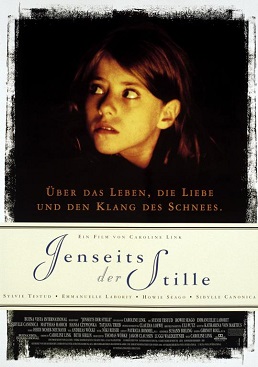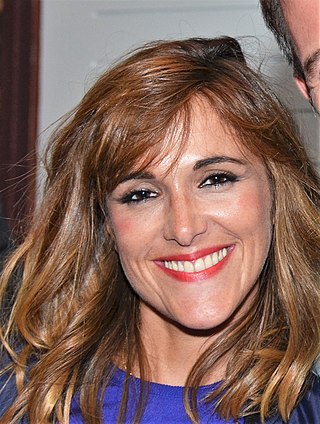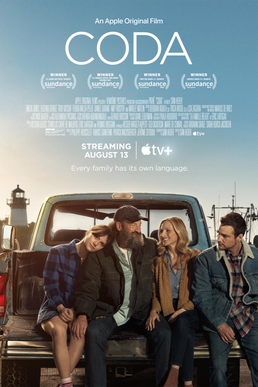
Marlee Matlin is an American actress. She is the recipient of numerous awards, including an Academy Award, a Golden Globe Award, and a Screen Actors Guild Award, in addition to nominations for a BAFTA Award, and four Primetime Emmy Awards.
Deaf West Theatre is a non-profit arts organization based in Los Angeles, California, US. It is most well known for its Tony Award-nominated productions of Big River and Spring Awakening.
A child of deaf adult, often known by the acronym CODA, is a person who was raised by one or more deaf parents or legal guardians. Ninety percent of children born to deaf adults can hear normally, resulting in a significant and widespread community of CODAs around the world, although whether the child is hearing, deaf, or hard of hearing has no effect on the definition. The acronym KODA is sometimes used to refer to CODAs under the age of 18.

Khamoshi: The Musical is a 1996 Indian Hindi-language romantic drama musical film. The film was directed by Sanjay Leela Bhansali in his directorial debut. The film stars Salman Khan, Manisha Koirala, Nana Patekar and Seema Biswas.
Deaf cinema is a movement that includes all works produced and directed by deaf people or members of the deaf community and is led by deaf actors. All these works have a tendency to nurture and develop the culture's self image and to reflect correctly the core of the Deaf culture and language.

Beyond Silence is a 1996 German film directed by Caroline Link. The film was nominated for the Academy Award for Best Foreign Language Film at the 70th Academy Awards.
"Je vole" is a 1978 song by French singer Michel Sardou and the title track of the same titled album Je vole by Sardou. The B-side of the single was "8 jours à El Paso". The lyrics of "je vole" were co-written by Michel Sardou and Pierre Billon and the music was composed by Sardou himself. The song was a big commercial success reaching number 3 in France selling approximately 500,000 copies.
The 20th Lumières Awards ceremony, presented by the Académie des Lumières, was held on 2 February 2015, at the Espace Pierre Cardin in Paris. Nominations were announced on 12 January 2015. Saint Laurent garnered the most nominations with a total of five. Timbuktu, La Famille Bélier and Love at First Fight won two awards each.

Anne Edwige Maria Peichert, known by her stage name Louane Emera or simply Louane, is a French singer and actress. In France she became known for being a semi-finalist in the 2013 season of The Voice: la plus belle voix, and is known internationally for her role in the 2014 film La Famille Bélier, for which she won the César Award for Most Promising Actress. She plays a leading role in the 2022 French TV series Beyond Signs.

Victoria Bedos is a French author, screenplay writer, singer and actress.

The 6th Magritte Awards ceremony, presented by the Académie André Delvaux, honored the best films of 2015 in Belgium and took place on February 6, 2016, at the Square in the historic site of Mont des Arts, Brussels beginning at 8:00 p.m. CET. During the ceremony, the Académie André Delvaux presented Magritte Awards in 22 categories. The ceremony was televised in Belgium by BeTV. Actress Marie Gillain presided the ceremony, while Charlie Dupont hosted the show for the second time.

No Ordinary Hero: The SuperDeafy Movie is a 2013 American drama film directed by Troy Kotsur and produced by Douglas Matejka and Hilari Scarl, with music score by H. Scott Salinas. The film stars John Maucere as Tony Kane/SuperDeafy and Zane Hencker as Jacob Lang. The film tells the story of a deaf actor who portrays a superhero on a children's television show and wants to help a young deaf boy who gets bullied at school. The film is open captioned in English.

CODA is a 2021 coming-of-age comedy-drama film written and directed by Sian Heder. An English-language remake of the 2014 French-Belgian film La Famille Bélier, it stars Emilia Jones as Ruby Rossi, the child of deaf adults (CODA) and only hearing member of her family, who attempts to help her family's struggling fishing business while pursuing her aspirations to become a singer.

Troy Michael Kotsur is an American actor. Born deaf, Kotsur made his acting debut in the late 1980s working with the National Theatre of the Deaf. His television debut was in a 2001 episode of Strong Medicine and his film debut was in the 2007 thriller The Number 23.
The 75th British Academy Film Awards, also known as the BAFTAs, were held on 13 March 2022 at the Royal Albert Hall in London, honouring the best national and foreign films of 2021. Presented by the British Academy of Film and Television Arts, accolades were handed out for the best feature-length film and documentaries of any nationality that were screened at British cinemas in 2021.
Philippe Rousselet is a French film producer. He won the Academy Award for Best Picture for the 2021 American film CODA, a remake of the 2014 French film La Famille Bélier, which he had also produced.

CODA (Soundtrack from the Apple Original Film) is the soundtrack album to the 2021 film CODA. The album featuring 18-tracks was released by Republic Records on August 13, 2021, the same day coinciding with the theatrical and streaming release on Apple TV+. It features original songs composed by Marius de Vries, co-produced the tracks with Nicholas Baxter, and incorporated tracks were compiled into the album. The film's lead cast members, Emilia Jones and Ferdia Walsh-Peelo, had sung for most of the tracks in the film, along with CODA choir members (students from the Berklee College of Music) recording for few tracks.











